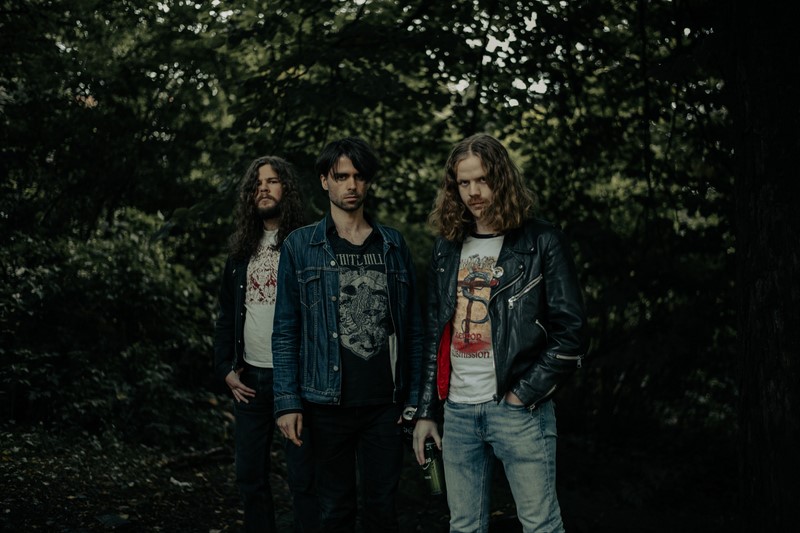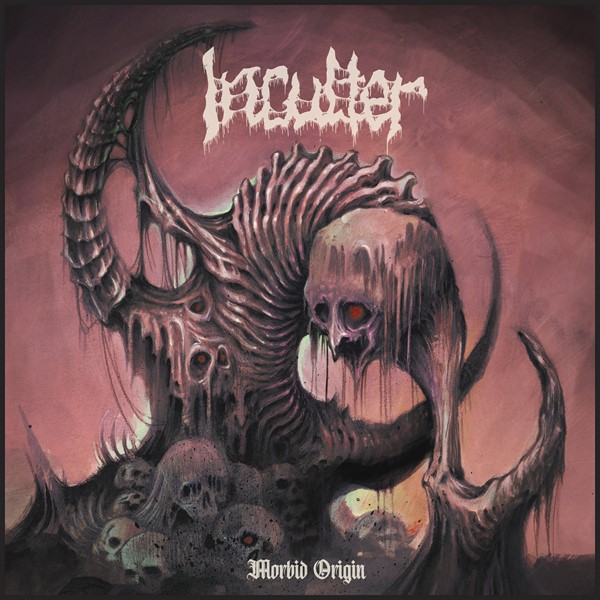 Hi! Can you walk us through the evolution of your sound from your earlier releases to “Morbid Origin”?
Hi! Can you walk us through the evolution of your sound from your earlier releases to “Morbid Origin”?
Hey dude! Sure thing. It all started with a few singles/demos, me and our first drummer, Even Bakke, jammed out and recorded in our garage. Even though we had been into thrash metal for many years at that time, those demos were extremely inspired by the Norwegian and Swedish underground metal scene, with bands like Antichrist, Aura Noir, Deathhammer and Nekromantheon to mention a few. We later on recorded an EP entitled “Stygian Deluge” which kind of starts showing what Inculter were going to become in terms of genre. We started to take lots of inspirations from black and death metal and merged them into our style of thrash metal. This all happened very naturally and led up to our first album “Persisting Devolution” becoming an album with riffs and inspirations taken from all over the extreme metal genre, while the songs are still based around classic thrash metal. We recorded this album ourselves in the garage were we rehearsed, and you can really hear the youthful energy that we had at that time. Moving on to our second album “Fatal Visions”. By this time, we had gotten a new drummer and also a second guitar player. I remember being super inspired by Slayer’s Hell Awaits and Sepultura’s Schizophrenia while creating the songs for this album. I (Remi) also studied music production and now had a studio and lots of cool gear available. This is an album packed with a thousand riffs and a pretty cool production I think, with solid roots in the Slayer/Sepultura inspirations. Moving on to the creation of our third and latest album “Morbid Origin”. I remember after recording “Fatal Visions” I was pretty tired of creating the classic thrash metal riff-fest style that we’d been doing, and was struggling to stay inspired with doing the same thing again. I did not want us to just repeat ourselves, and I knew that we needed to do something a bit different to keep us inspired. We could have probably done the same thing as earlier, but I’m pretty sure it would have sounded uninspired and shitty if we were forcing it. So, after lots of back and forth on trying to find our “new path”, i think we landed on something that we are really happy with, and felt were needed in the thrash metal genre. “Morbid Origin” ended up as a very dynamic album, with lots of different tempos, guitar melodies, and thought out song structures. I think this album has opened up a ton of inspiration towards our next album, and I’m looking forward to seeing what more we can do. Damn… that’s a way too long answer.
How did the reception and experience of “Fatal Visions” influence the direction you took with “Morbid Origin”?
Hmm, I don’t know if either the reception or the experience of “Fatal Visions” had very much to do with where “Morbid Origin” ended up. I think it was mostly our own mindset. As mentioned earlier, we did not want to repeat ourselves, and personally, I feel that there are lots of bands doing the same-ish style that we did on “Fatal Visions”, so it didn’t feel like there was anything we HAD to do that hadn’t been done before. But of course, all the inspirations that led us to our second album, also inspired very much of our third, so the albums are very much connected in terms of inspirations. The biggest difference is probably that we allowed ourselves to drag in lots of inspiration from Mercyful Fate and early Metallica, which is something that has always been with us, but could not be heard in our previous two albums.
What thematic elements or inspirations did you draw from when crafting the songs for “Morbid Origin”?
Thematically, the album is all over the place. It’s not a concept album at all, so the lyrics of each song has its own theme. Everything from politics, to nuclear strikes and satanic rituals. Some things come from watching movies, some from reading the news, some from just listening to albums that we love and we pick up a theme here and there.
Could you elaborate on the significance of the album title, “Morbid Origin,” and how it reflects the content and themes explored in the music?
The reason behind choosing “Morbid Origin” as the album title comes from the song as a whole, not the lyrical theme or just the title. We felt that this song had everything we wanted with the new direction we went for, and wanted it to be something that stood out. Also, we just liked the title, and felt it was fitting as it could encapsulate most of the songs themes within it.
How does the songwriting process typically unfold within INCULTER? Are there specific approaches or rituals you adhere to when crafting your music?
The standard way for us to write the music is that I write some riffs at home and try to get a few riffs together for some kind of rough structure, and then we try to jam it out in the rehearsal space. Quite often, we find new riffs and new structures when testing it together. It’s a lot of just trying and failing, going back and forth a thousand times before landing on a result that we are pleased with.
What role does aggression play in your creative process, and how do you channel it into your music?
Hmm, I wouldn’t say that it has a direct effect on our songwriting, like riffs or melodies, but it may affect the themes we choose for lyrics. Being annoyed over something stupid that you read in the newspapers for example can be good to channel into the lyrics. The most important thing about aggression in our music though is that we perform it aggressively, we really have to mean what we’re doing. I hate seeing rock and metal bands half-assing live shows, they may play the right notes at the right time and all, but that does nothing to me if they just play weak and like they don’t mean it.
What makes “Lethal Salvation” song stand out to you, and how does it encapsulate the essence of the album?
“Lethal Salvation” may be the weirdest song on the album to me. It has so much Mercyful Fate inspiration in it, and is a very atypical Inculter song if you ask me. That’s also a good reason to put it on the album, as we wanted to broaden our way of playing thrash metal. I am very happy with how it turned out, especially the fast middle part, and I like the stupid “triple” ending.
As a Norwegian thrash metal band, how do you perceive your place within the broader landscape of Norwegian metal, which is often associated with black metal?
The Norwegian metal scene is, luckily, much more than just the infamous norwegian black metal. The underground scene here has great bands in every metal genre, though some of them are pretty unknown to the rest of the world. So we feel like we actually fit right in. The cool thing about many of the bands here is that they have some kind of roots in the black metal thing. Like for example Aura Noir has inspired a lot of the thrash metal bands here, which may influence the way we play our thrash metal, and makes it a bit darker than it probably would have been without the black metal scene in the ’90s.
How has Fenriz’s recognition impacted the band’s trajectory and confidence in your musical pursuits?
I guess you refer to when he mentioned our song “Chained to the Void” in his radio show recently? I’m not quite sure actually. It’s of course very cool to hear him speak good words of our music, and maybe it can give us some extra confidence to follow our own path into the next album, I don’t know. The best thing though, is probably that there are many people listening to what he has to say, and when he praises a song, people will at least give it a listen.
Thrash metal has a rich history and a dedicated fan base. How do you navigate the expectations of both longtime fans and newcomers to the genre with your releases?
I don’t think we should have anything to do with other people’s expectations with our releases, longtime fans or newcomers. We just try to make something that reflects what we’d want to hear, that is the most important thing. If no one likes it, at least know that we did what we wanted to do and can be proud of that.
Can you share any memorable experiences from the recording sessions or the creation process of “Morbid Origin”?
One of the best memories of creating the album was the first time we tried out “Chained to the Void” live. It felt perfectly right, fit right into our set and the audience seemed to dig it, which gained good confidence into the recording process that started two weeks later.
How does album artwork tie into the album’s themes and atmosphere?
We just wanted the artwork to be something simple, morbid and absurd. Didn’t really think much about the themes of the album to be honest, the important thing for me is that it fits the feeling of the music and can give it that little extra feeling. It is very Inspired by old death metal demos and Arise by Sepultura.
Are there any particular bands or artists, outside of the thrash metal genre, that have influenced you?
For sure, as mentioned earlier, Mercyful Fate was a big inspiration. We also got very inspired by bands like the old Scorpions, Judas Priest and Black Sabbath to mention a few.
How do you see the role of INCULTER within the broader landscape of thrash metal today?
Our role is to continue doing what we’ve started with “Morbid Origin”, trying to find our own path without losing the important roots of thrash metal.
Plans for the future?
The plan for now is to play more gigs, maybe do a European tour to promote our latest album. We’ve also barely started thinking about riffs and songs for the next album, and hope to get it done a bit faster than we did with “Morbid Origin”.
Cheers!
https://www.facebook.com/Inculter
If you really would like to support Antichrist, you can just Share our article.
You can also support Antichrist by sending a couple bucks to cover some webhosting expenses. =>> PayPal



